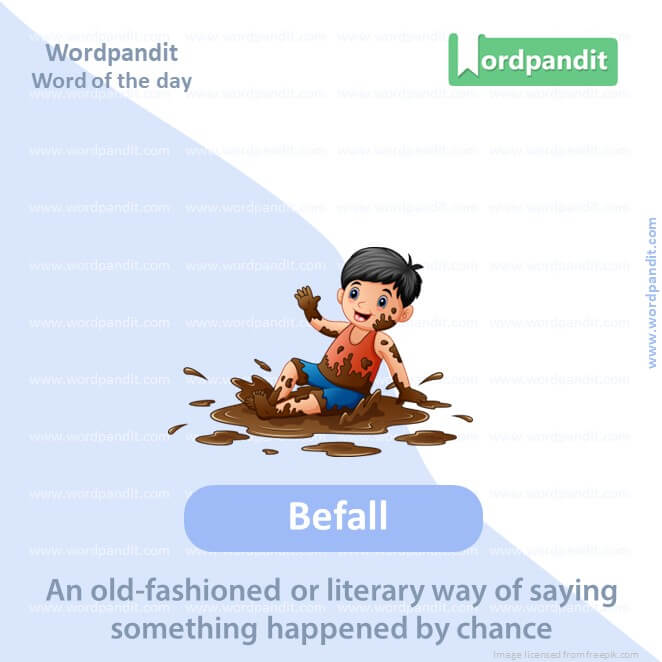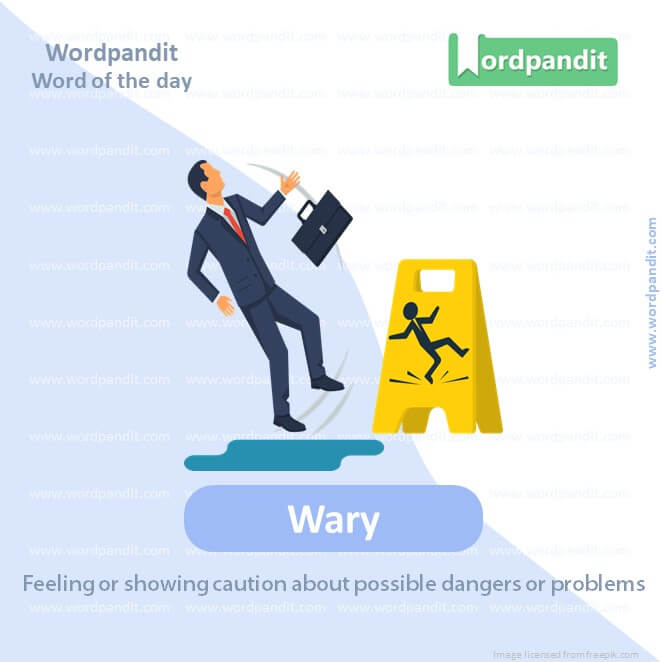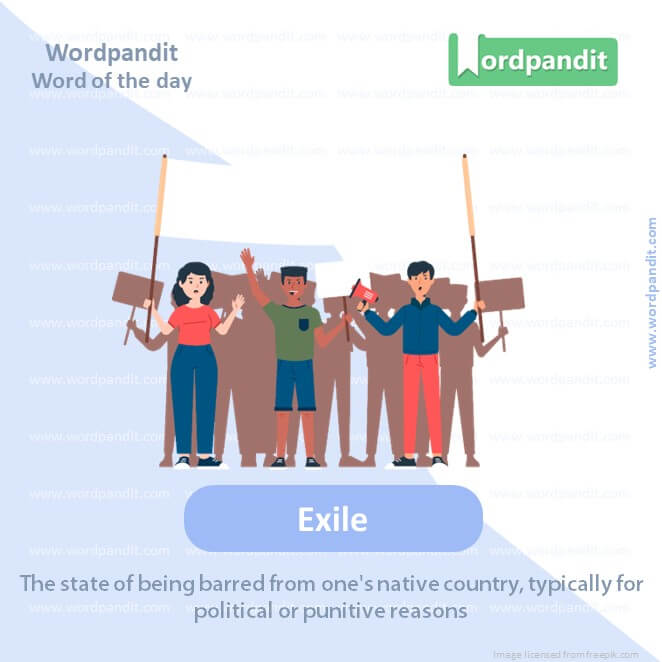Daily Vocabulary Words: List of Daily Used Words
Hi there. Welcome to this special section @ Wordpandit.
Our endeavour here is straightforward: highlighting important daily vocabulary words, you would encounter in The Hindu. This is your repository of commonly used words; essentially, we are posting a list of daily used words. Hence, this has significant practical application as it teaches you words that are commonly used in a leading publication such as The Hindu.
Visit the website daily to learn words from The Hindu.

WORD-1: BEFALL
CONTEXT: Many in the village fear the calamities that might befall them if the dam upstream isn’t repaired soon.
SOURCE: The Hindu
EXPLANATORY PARAGRAPH: Imagine you’re playing with your toys and suddenly, out of nowhere, your toy breaks. That means something unexpected happened to your toy. That’s what “befall” means. It means something happens, usually unexpectedly.
MEANING: An old-fashioned or literary way of saying something happened by chance (verb).
PRONUNCIATION: bih-FALL
SYNONYMS: Occur, transpire, happen, take place, come about, arise
USAGE EXAMPLES:
1. Let whatever may befall, we’ll face it together.
2. No one could predict the misfortunes that would befall him.
3. She prayed that no harm would befall her children.
4. Legends tell of the disasters that befell the village.

WORD-2: WARY
CONTEXT: Residents have become wary of the promises made by politicians, especially during election seasons.
SOURCE: The Hindu
EXPLANATORY PARAGRAPH: Imagine you’re about to touch a hot stove, but you stop and think because you remember it can burn you. Being “wary” means being careful about possible dangers.
MEANING: Feeling or showing caution about possible dangers or problems (adjective).
PRONUNCIATION: WAIR-ee
SYNONYMS: Cautious, watchful, alert, vigilant, guarded, circumspect
USAGE EXAMPLES:
1. Be wary of strangers offering candy.
2. She was wary of signing the agreement without reading it.
3. Cats are often wary of water.
4. The deer remained wary of any movement in the forest.

WORD-3: SPECTACLE
CONTEXT: The annual cultural festival was nothing short of a grand spectacle, drawing tourists from all corners of the nation.
SOURCE: The Hindu
EXPLANATORY PARAGRAPH: Imagine seeing a big parade with floats, balloons, and dancers. It’s so colorful and amazing that you can’t look away. That’s a “spectacle”, something really impressive to look at.
MEANING: A visually striking performance or display (noun).
PRONUNCIATION: SPEK-tuh-kul
SYNONYMS: Display, show, performance, exhibition, presentation, extravaganza
USAGE EXAMPLES:
1. The fireworks were a beautiful spectacle.
2. Tourists gathered to watch the spectacle of the parade.
3. The mountain landscape was a breathtaking spectacle.
4. The sports game turned into quite a spectacle with all the unexpected turns.

WORD-4: EXILE
CONTEXT: The renowned writer, once in exile for his outspoken views, returned to his homeland after a decade.
SOURCE: The Hindu
EXPLANATORY PARAGRAPH: Imagine having to leave your home and not being allowed to come back. Maybe because you did something wrong, or because it’s not safe. Being in “exile” means being sent away from home like that.
MEANING: The state of being barred from one’s native country, typically for political or punitive reasons (verb).
PRONUNCIATION: EX-ile
SYNONYMS: Banishment, expulsion, eviction, ostracism, deportation, displacement
USAGE EXAMPLES:
1. The author lived in exile for many years.
2. The king was sent into exile after the revolt.
3. They went into exile to escape persecution.
4. The family was exiled from the country due to their beliefs.

WORD-5: FORESIGHT
CONTEXT: The city planners’ foresight in designing green spaces has immensely benefited the urban ecosystem.
SOURCE: The Hindu
EXPLANATORY PARAGRAPH: Imagine you’re packing an umbrella on a sunny day because you think it might rain later. That’s “foresight”. It’s like having a tiny crystal ball in your brain that helps you plan for the future.
MEANING: The ability to predict or anticipate future events or consequences (noun).
PRONUNCIATION: FOR-site
SYNONYMS: Forethought, anticipation, prediction, prudence, foreknowledge, prescience
USAGE EXAMPLES:
1. Her foresight saved us from a major inconvenience.
2. Investing in technology showed great foresight.
3. He lacked the foresight to see the potential problems.
4. Thanks to her foresight, we had enough supplies during the storm.
WORD-6: AVOW
CONTEXT: The minister took to the podium to avow his commitment to transparency and good governance.
SOURCE: The Hindu
EXPLANATORY PARAGRAPH: Imagine telling everyone that blue is your favorite color, and you’re not afraid to say it loud. When you “avow” something, you say it confidently and openly.
MEANING: To admit openly and bluntly; to declare confidently (verb).
PRONUNCIATION: uh-VOW
SYNONYMS: Affirm, assert, declare, profess, claim, admit
USAGE EXAMPLE:
1. He avowed that he was innocent.
2. She avowed her support for the new policy.
3. The leader avowed his commitment to the cause.
4. Despite the risks, she avowed her true beliefs.
WORD-7: TRANSGRESSION
CONTEXT: The report detailed the multiple transgressions committed by the company, leading to environmental degradation.
SOURCE: The Hindu
EXPLANATORY PARAGRAPH: Imagine you have rules at home, like no jumping on the bed. If you jump anyway, you broke the rule. “Transgression” is a fancy word for doing something you’re not supposed to.
MEANING: An act that goes against a rule or law (noun).
PRONUNCIATION: trans-GRESH-un
SYNONYMS: Offense, sin, crime, violation, misdemeanor, infringement
USAGE EXAMPLE:
1. His transgressions were too many to ignore.
2. She asked for forgiveness for her past transgressions.
3. The law is clear about the penalties for such transgressions.
4. The community was shocked by the young man’s transgression.
WORD-8: CRADLE
CONTEXT: The region, often regarded as the cradle of ancient arts, has become a hub for modern creative expressions.
SOURCE: The Hindu
EXPLANATORY PARAGRAPH: A “cradle” is like a cozy bed for babies. It rocks them gently to help them sleep. It can also mean holding something gently and protectively, like when you cradle a baby bird in your hands.
MEANING: A baby’s bed with rockers (noun); to hold something gently and protectively (verb).
PRONUNCIATION: KRAY-dul
SYNONYMS: Crib, bassinet, cot, bed, rocker, berth
USAGE EXAMPLE:
1. The baby slept peacefully in the cradle.
2. She cradled the injured animal in her arms.
3. The phone was cradled in its charger.
4. The mother gently cradled her newborn.
WORD-9: VIRULENT
CONTEXT: The virulent strain of the virus has prompted health officials to issue strict guidelines for travel and public gatherings.
SOURCE: The Hindu
EXPLANATORY PARAGRAPH: “Virulent” is like the strongest villain in a superhero movie. It’s something very harmful or bad. If a bug or germ is virulent, it can make you very sick.
MEANING: Extremely harmful or poisonous; bitterly hostile (adjective).
PRONUNCIATION: VIR-yuh-lent
SYNONYMS: Toxic, venomous, noxious, malicious, hostile, caustic
USAGE EXAMPLE:
1. The snake’s bite released a virulent venom.
2. He had a virulent hatred for his enemies.
3. The disease was virulent and spread quickly.
4. She received virulent criticism for her actions.
WORD-10: AUTOMATION
CONTEXT: The rise of automation in the manufacturing sector has raised concerns about job displacements in the traditional industries.
SOURCE: The Hindu
EXPLANATORY PARAGRAPH: Think of a robot that can make your bed for you without you having to do anything. “Automation” means using machines or computers to do jobs without needing people.
MEANING: The use of machines or computers to perform tasks that were once done by humans (noun).
PRONUNCIATION: aw-toh-MAY-shun
SYNONYMS: Mechanization, computerization, robotization, digitization, technology
USAGE EXAMPLE:
1. The factory introduced automation to increase production.
2. Automation has changed the way we live and work.
3. Some fear that automation will take away jobs.
4. The future of transport lies in automation and self-driving vehicles.
Vocabulary
Language is a confluence of thoughts, emotions, and experiences that find vibrant expression through words. In this spectrum, ‘vocabulary’ shines as a critical aspect that shapes and directs our language proficiency. It offers depth, nuance, and clarity to our expressions. However, mastering ‘vocabulary’ is an art that requires a strategized approach.
An intensive strategy for learning ‘vocabulary’ goes beyond the limiting precincts of memorization. Instead, it nudges learners towards comprehension and application. To understand ‘vocabulary’, take a step forward from traditional textbooks and classroom sessions, and embrace the vast world of books, articles, podcasts or digital content in the language you are learning. This step allows you to understand words in context, see how they are used in different situations, and absorb words as part of the natural flow of language.
As you journey through ‘vocabulary’, remember that this expedition should not be a race. Rather, it’s a marathon where pacing yourself is pivotal to long-term success. Learning a few words each day and consolidating your knowledge through regular revision tends to be more effective, as it prevents cognitive overload and promotes solid retention.
Interactive learning tools can provide valuable support in assimilating ‘vocabulary’. Use of flashcards, language-learning apps, or memory-enhancing software can make this process more engaging and effective, reinforcing the ‘vocabulary’ in your memory.
Lastly, practice is an incontrovertible part of mastering ‘vocabulary’. Utilize the learnt vocabulary in your daily conversations, write-ups, or presentations to ensure an active application. Doing this fosters recall and cements understanding.
In summation, learning ‘vocabulary’ is a journey that should be embraced with an integrated approach, where understanding and application are the key elements. By engaging with diverse learning resources, pacing the learning process, employing interactive learning tools, and practicing regularly, the journey of mastering ‘vocabulary’ becomes a fulfilling and enriching experience.













